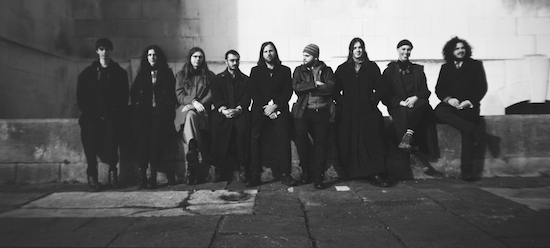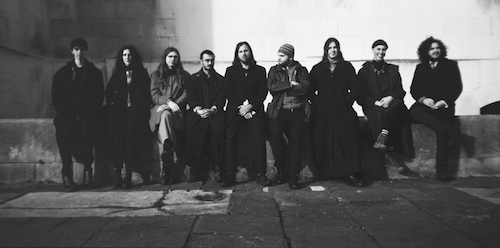Photo by Jordan Reyes
To receive Live At Acid Horse by Shovel Dance Collective, become a Quietus Sound + Vision subscriber
“I don’t want to sound too much like a hippy, but it felt like the land was imbued with magic,” says Mataio Austin Dean. “I don’t believe in ley lines and points of energy, but I understand why some people do.” Over pints in a London pub, the Shovel Dance Collective vocalist and guitarist is discussing Pewsey in Wiltshire and the countryside that surrounds it, where the band found themselves last summer for a performance at Mark Pilkington and tQ founder John Doran’s Acid Horse three day music event – audio from which is released today exclusively to our Sound + Vision subscribers.
We’re joined by three others from the collective’s nine-strong membership: banjo and shruti box player Jacken Elswyth, organist and vocalist Nick Granata and multi-instrumentalist Daniel Evans. All of them are full of shared enthusiasm, their words tumbling over one another when asked for their recollections of the area, overlooked by the famous White Horse, a hill figure carved into chalk. The four wax lyrical about the churches they visited – “we’re comprehensive” Elswyth says – particularly the 12th century All Saints, in Alton Priors. There they took in its stunning glass windows engraved by Laurence Whistler and his son Simon, the sarsen stones in its foundations accessed via trapdoor, and the 1,400 year old yew tree outside, the latter two hinting at the site’s sacred status going back far further than the building’s Norman construction. They reminisce about encountering crop circles, and about conversations with the Bohman brothers of Secluded Bronte (also on the bill) on the subject of ancient ruins. Dean recalls the wider landscape: “The downland at the White Horse, and then these peaty lowlands. This mad type of stile that I’d never seen before, and random stepping stones in the marshy fields… I fucking loved it.
The downside of all this exploration was that by the time they got to The Barge Inn, where Acid Horse is held, they were “really fucking tired,” as Dean puts it. “Dawn Terry was playing and I nearly hallucinated because I was half asleep.” He was also, he says, “having a weird time internally” in the days leading up to that weekend. Although joined by harpist Fidelma Hanrahan and violinist Oliver Hamilton they were also three members down, with Josh Barfoot (bodhran, hammered dulcimer, percussion, accordion), Tom Hardwick-Allen (trombone, harmonica) and Alex Mckenzie (whistle, flute, accordion, burdola) all absent due to an engagement with their experimental project Gentle Stranger, and a train strike that put paid to their plans to link up with those in Wiltshire afterwards. “It was a lineup of six of us who I don’t think had ever played together before,” Elswyth recalls.
Playing without percussion “made it wilder,” says Evans, who had to strain to fill the gaps left by his erstwhile bandmates during their set’s dense improvisational moments. By the time they reached the crescendo of their final song, ‘The Grey Cock’, one of the two pieces released to tQ subscribers, “all I can remember is the pain my hands.” Nor is there is much pristineness to the recording; in the background of the record, you can hear the whoops of the crowd as Hamilton lets loose on his violin during the medley that forms the other half of the release, and on the quiet parts of ‘The Grey Cock’ there are clinking glasses, the babblings of a baby and their parent’s efforts to quiet them. Elsewhere during the show, the band recall, another child was demanding they play the theme tune from Ghostbusters having heard Evans speak about the role of ghosts in many traditional folk songs. “Imagine that on a hammered dulcimer!” says Dean.
And yet, the performance thrived rather than suffered under such circumstances. For a start, due to their leftist principles (the ‘Collective’ in their name is important) there is no hierarchy to the group’s membership that might be thrown off by absenteeism. In addition, says Evans, a large membership in general “means that if one or two people are feeling shit, there’s a good lot of others to push it forward.” Being deprived of certain instruments also served as a way to freshen things up, adds Granata. “Part of what we do has a density, and when we play live it can be hard to pick things out. Being stripped back a bit and having to respond to that was partly a pleasure.” The forced reworking of their performance also chimes nicely, says Elswyth, with what she calls “this iterative quality of folk music, where no version is definitive.”
As musicians whose entire ethos is based around the fact that traditional folk music is as relevant to modern life as it was to those in the past, and that traditional and progressive philosophies need not be opposites, a gig like Acid Horse – messy, communal, staunchly DIY – is far more suitable a setting than any polished showcase. Though several centuries old, ‘The Grey Cock’’s narrative of a ghost returning to seek their still-living lover, for instance, evokes themes of loss and desperation that are no less relatable today. This is then intensified by the way they perform it. On this release Granata’s serene and baleful voice can be heard weaving through the hushed sounds of the crowd. A creeping drone grows gradually louder and more discordant, fraying at the edges (you can see why Evans’ fingers were hurting by the end), pushed further and further until it reaches a point of total overwhelm.
Recently, Evans says, he was asked a deceptively simple question: why put music to these old words at all? “The answer is that there’s something we’re trying to achieve in the band that’s beyond words, a sublime quality beyond linguistics that we’re attempting to convey, that attempts to evoke some sublime experience, that will somehow bring you closer to a sense of the ancestral. Playing traditional music brings you into a community of ghosts,” he says. The words themselves are important, he continues, “but the music we’re making often moves like this organic bed of viscous material around the voice. With the mind’s eye you can see through all the versions you’ve ever heard of these songs, see the sublimity in the words, but also in the way the contours move you can see a way that they can be blown out, experimented with and heightened.”
When firing on all cylinders – as they most certainly are on these recordings – Shovel Dance Collective succeed in tapping into the sublime. For both audience and band, a gig can be transcendent; Dean might have been going through a tough time in the days that surrounded the show, but when onstage, he says, “there was a division. I was there, surrounded by all my friends and playing great music. In quite an uncynical way, when I sing these songs I do feel like I’m entering the realm of the ancestors, entering this kind of time vortex. It’s kind of an addictive feeling.” On those wanders around the Wiltshire countryside, he says, it was ultimately not the landscape that most moved him, but the remnants of all those who have once inhabited it, who might have attended that church, and before that the sacred site that stood there previously, or who looked up at the White Horse just as he did as they wandered those hills. “This density of human culture, death, and life.” This, ultimately, is what’s at the heart of Shovel Dance Collective’s work, and the reason it resonates so strongly – a desire to go beyond the pastoral and bucolic imagery so often fetishized by lesser practitioners, and to refocus the gaze on the joy, sorrow, ugliness, messiness and brilliance of the people who have come before.
To receive Live At Acid Horse by Shovel Dance Collective, as well as a host of other benefits including exclusive essays, podcasts and playlists, and loads more specially-commissioned music, become a Quietus Sound + Vision subscriber. You can do so here



